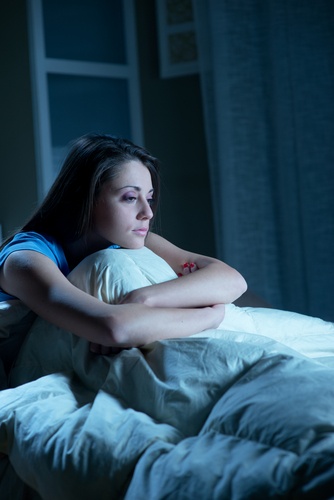
If you answered yes, you are not alone. In a recent review, as many as 95% of Americans have reported an episode of insomnia at some point during their lives. Insomnia is characterized by the following:
Inability to fall asleep, despite efforts and preparation
Waking up after sleeping less than 6 hours
Waking up multiple times per night and being unable to fall back asleep
Not feeling refreshed after a night’s sleep
I have met people who say “I have tried many things that haven’t worked, I am just wired to be an insomniac.” However, I’ve found that a good night’s sleep really is possible in most cases. And while a quality mattress can help, it rarely will solve the problem.
The first thing to do is get to the root cause, so that you can be sure you are applying the right solution. However, since sleep is impacted by so many things, lifestyle strategies are the foundation on which good sleep is built.
Here are 5 lifestyle changes that will help you overcome your insomnia:
1. Avoid drugs and regulate your stimulant intake
A. Sleeping pills are not the answer: Most people who can’t sleep use sleeping pills, but research shows that sleeping pills are not the answer to insomnia. Long term use of sleeping pills can lead to harmful physical and psychological health consequences including death.

- Avoid drugs and regulate your stimulant intake
A. Sleeping pills are not the answer: Most people who can’t sleep use sleeping pills, but research shows that sleeping pills are not the answer to insomnia. Long term use of sleeping pills can lead to harmful physical and psychological health consequences including death.
B. Quit smoking: Cigarettes contain nicotine, a stimulant which makes smokers take o-ALCOHOL-SIDE-EFFECTS-DRINKING-SLEEP-SLEEPING-facebooklonger to fall asleep, wake up more frequently, and have less deep sleep. If you have tried to quit smoking in the past, keep trying. It’s common for smokers to try multiple times before succeeding.
C. Get smarter about your caffeine intake: Caffeine negatively affects both the quality and duration of sleep. Effects last until all consumed caffeine it is metabolized out the body, which can take 5-8 hours, depending on your age, genetics and health conditions.
D. Don’t drink alcohol before going to bed: Alcohol initially sedates you to sleep, but its metabolites stimulate you and disrupt your REM sleep, which is important for mental focus, concentration, learning, and memory. You can always enjoy some wine early in the day or once you bring your sleep into a good rhythm. There is also a growing body of anecdotal evidence that CBD oil can help people get to sleep. - Create a regular sleep schedule—get serious about night time relaxation
A consistent sleep and wake-up schedule synchronizes your biological clock and rhythm, leading to better sleep. In order to create a regular sleep and wake up schedule, it helps to have a winding down routine. Thanks to our biological clock, the body has day and night time hormones. Failing to wind down tricks the body into delaying sleep hormones.
Let’s face it, there is always something else that needs to be done in the evening. Then before you know it, it is 2am, and the longer you stay up, the harder it is for your body to switch back into producing nighttime hormones that promote sleep. Setting an alarm for going to bed is effective as you get used to a routine.
For example, I got into a rhythm where my day ends at 9pm. I turn off my electronics while dimming the house lights, write down five things I’m grateful for, take a warm shower, take a few deep breaths, change into pajamas, turn off all the lights, put in my earplugs, and ease into bed.
- Eat healthy to promote sleep
Several research studies have shown that deficiencies in selenium, calcium, potassium, magnesium, Vitamin C, Vitamin D, Vitamin B6, 5HTP, Omega 3, and melatonin cause sleep disturbances. I recommend doing tests to see if you have any deficiencies and to change your diet accordingly. Importantly, food affects the condition of your gut which plays a role in regulating the sleep cycle. - Anxiety and stress management routine: Deep breathing and meditation
If you feel anxious or stressed out before bed, deep-breathing has been found to break the cycle of spinning thoughts, therefore reducing your anxiety and stress and promoting sleep.
Regular meditators spend more time in deep sleep with enhanced REM sleep. Meditation during the day acts as practice for your brain to become efficient at regulating stress and anxiety and optimizing sleep hormones.
Exercise relaxes you, regulates stress hormones, and increases your adenosine, a chemical in the brain that makes you feel tired and ready for bed.
- Let Go of self-sabotaging behaviors and mindset
It can be tempting to watch TV before going to bed or to bring a phone into your bedroom. Screens, however, emit short wavelength blue light that suppresses melatonin and block initiation of the sleep cycle. Therefore, aim for 1 to 2 hours’ electronic silence before bed.
Blue-light filters can help, but what you are reading and the flickering light of the screen still keep the brain alert. Even low electronic lighting such as from a charging phone still emits strong electromagnetic frequencies.
If you follow these sleep hygiene practices nightly, you’re almost guaranteed to get more fulfilling sleep at night and be more awake and alert during the day. If however, you’re practicing these tips and still finding yourself feeling tired and sluggish during the day, it could be a sign of a sleep disorder.
If you believe that your sleep troubles are being caused by a sleep disorder, contact your local sleep clinic for a consultation with a sleep specialist. At The Alaska Sleep Clinic, we specialize in diagnosing and treating a wide variety of sleep disorders, and have helped thousands of Alaskans improve the quality of their sleep.
Quality sleep is directly linked to your overall health, and if you’re not getting enough of it, give us a call and let us help you discover the cause of your sleep problems.

In addition to being a Registered Nurse, a Spencer Institute Certified Sleep Science Coach, and a Certified Health Coach, Joselyne has been trained in Holistic Sleep Solutions, looking at how lifestyle, biochemical stress and hormones, thyroid and other health issues, nutrition, and gut health impact sleep. Joselyne lives in Vancouver and enjoys running and exploring outdoors and nature.








